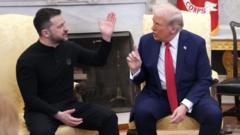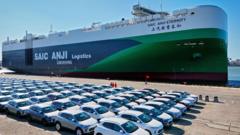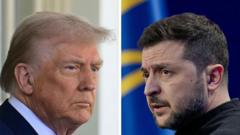With Trump’s return to the White House anticipated, European leaders are bracing for what might be a more contentious relationship. As they navigate their own economic and political challenges, concerns mount about how prepared the continent is to handle Trump's unyielding transactional approach, particularly regarding NATO and international trade.
Navigating the Turbulent Waters: Europe's Dreaded Reunion with Trump

Navigating the Turbulent Waters: Europe's Dreaded Reunion with Trump
As the US braces for a Trump-led administration, Europe faces uncertainties regarding trade, defense, and diplomatic relations, highlighting lessons from past interactions.
As the political landscape evolves in the U.S., Europe finds itself on the brink of a complex and potentially fraught re-engagement with Donald Trump following his recent election victory. Many European citizens express frustration over domestic issues overshadowed by the relentless focus on Trump, as observed by German teacher Iris Mühler. Amidst pressing economic challenges within Germany and France, Europe’s attention remains fixated on the return of a figure whose previous term was marked by tumultuous diplomatic relations.
Trump’s transactional ethos diverges markedly from the traditional diplomatic framework Europe has relied upon since World War II. Former German Chancellor Angela Merkel characterized Trump as a businessman with a winner-loser worldview, fostering resentment that he believes Europe has exploited U.S. resources. Observers note that his unabashed critiques of allies often divert attention from global adversaries, such as China.
Prompted by a trade surplus with the EU, Trump is already targeting Europe for blanket tariffs exceeding 20%. Such actions threaten to exacerbate Germany's economic woes, damaging its key export sectors. Analysts suggest that these tariffs may strategically shield American interests while upsetting long-standing alliances, leaving European states vulnerable and scrambling for an effective response.
Experts analyze how Trump's return risks stoking a trade war with rippling implications—where reciprocal actions between the U.S. and Europe could further impact supply chains, particularly if his administration adopts aggressive postures against China. European Commission officials assert readiness for various Trump-inspired scenarios, yet the unpredictability of Trump's agenda looms as a concern.
Complicating matters is the alliance defense relationship with NATO, which Trump has previously threatened to undermine unless European nations significantly heighten their military expenditures. European leaders, meanwhile, seek unified strategic defense cooperation amid fears that U.S. support may wane under a Trump administration.
The question emerges: how equipped is Europe to handle the impending Trump administration? While European unity has grown in recent crises—including Brexit and the war in Ukraine—the continent currently battles stagnation and rising populism. This could create fertile ground for nationalist sentiments, potentially complicating unified responses to Trump's initiatives.
Presidents like Emmanuel Macron endeavor to flatter Trump while also prepping Europe for self-sufficiency, recognizing that reliance on U.S. policies may not be guaranteed. In the face of all these challenges, the reality of a more right-leaning Europe may align more closely with Trump’s worldview than ever before.
The next chapter in transatlantic relations between Europe and the United States is unwritten, with many eyes fixed on how Europe will navigate Trump's demands and whether its leaders can assert their values in the face of potential conflicts over governance, human rights, and democracy. What is certain, however, is that the landscape ahead is filled with unpredictability and pressing choices for European leaders.






















